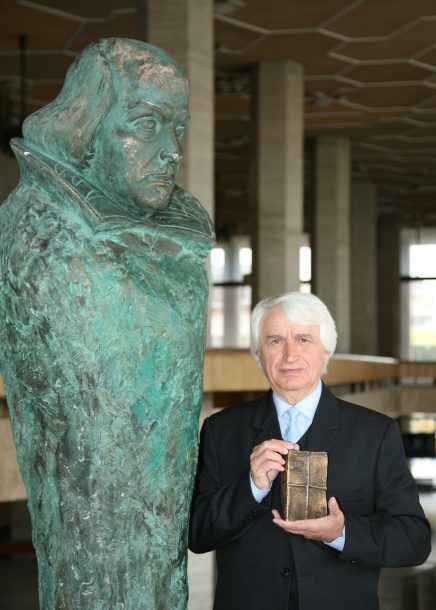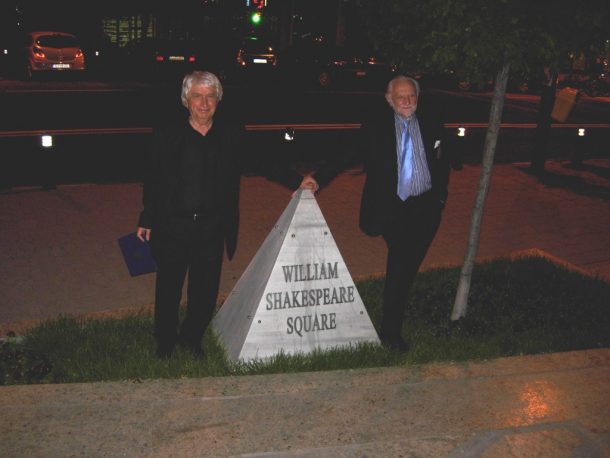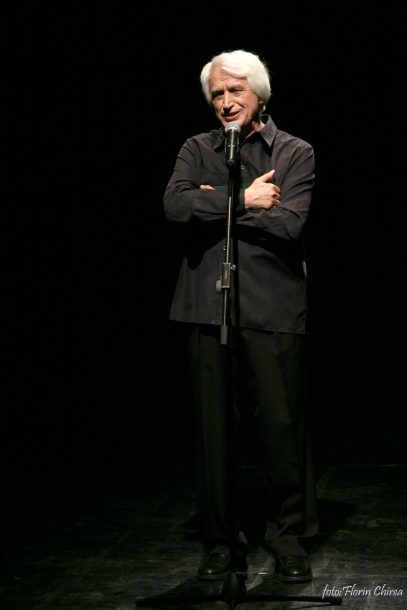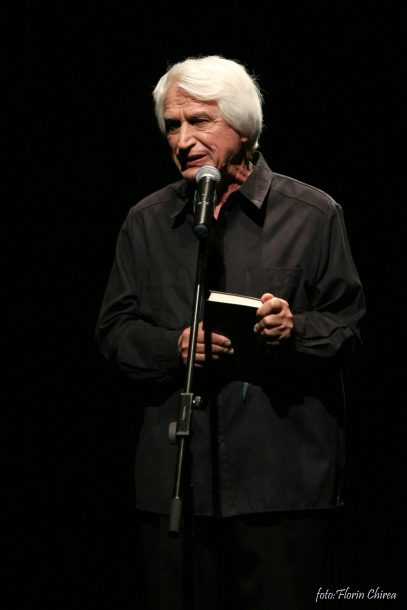The Southern Romanian city of Craiova is a survivor. It defied the social invasion that is industrialization, healed its wounds caused by the massive earthquake of 1977 and strangely, at a later moment, also freed itself from the paralyzing haze of the 90s, thereby becoming a vivid, modern city. Beautiful mansions, which are remnants of a city once chiefly dominated by rich merchants, still stand out proudly amidst the ambitious modernist assemblies of grey communism. A warm, salty breeze characteristic of the Mediterranean brings in a bountiful spring, along with all the told and untold romances of the generations that once dwelled in the city. And traces of once famous footsteps still ennoble its parks and alleys. And above all, once every two years, in April, the International Shakespeare Festival (produced by the National Theatre “Marin Sorescu” in Craiova along with the Shakespeare Foundation) arrives like a naughty wind, a gentle spirit which fills the streets with new people, and the evenings with emotions. Almost like “A Mid-spring Night’s Dream”.
This year, while commemorating four centuries since the passing of William Shakespeare, the theatrical festival in Craiova also celebrated its 10th anniversary. In ancient times, the number ten was considered to be a symbol of fulfillment and accomplishment. And it is exactly what the director and founder of the festival – Emil Boroghină – has longed for ever since its inception, in spite of everyone else regarding him as a mere dreamer. After all these years, I still don’t know what “stuff” the International Shakespeare Festival is made of. I don’t know when the idea to organize such an event occurred – whether it was night or summer, or if there was a tempest or pleasant weather. But it’s certain that his “dream” has indeed come true, and it has been around for over two decades.

Emil Boroghina at Craiova, 2016. Photo: Courtesy of Maria Zărnescu.
Peter Brook, Robert Wilson, Lev Dodin, Thomas Ostermeier, Eimuntas Nekrošius, Oskaras Koršunovas, Declan Donnellan, Richard Schechner, Yukio Ninagawa are merely a handful of the many world-renowned personalities who have sent their creations to Craiova – truly a testament to the longstanding relevance of Shakespeare. He’ll always be a contemporary and this festival, which is one of its kind in Romania, while also being exclusively dedicated to his work, is, in fact, a necessity in our times and for our world. What could be more appropriate than laughing at pretenses, false rules, preconceived ideas, phony airs, and vanities? What could be more liberating than believing that, even along with reason, there is still room for the unexplainable and the miraculous? And seeing in everyday things the design of the gods? It has been said that Boroghină put Craiova on the world map of Shakespeare. It is true. The festival would not have been possible (or, in the least, would not have reached its 10th year), without the Don Quixote of Romanian theatre who fought against all kinds of windmills, in order to bring top-of-the-line productions and celebrated artists in the city. Ever since its maiden venture in 1994, this Don Quixote has struggled by all possible and impossible means in order to make the festival survive with dignity. Actor and director, as well as manager and initiator of the festival, Emil Boroghină, who is simultaneously the president of the Shakespeare Foundation in Romania, gave the National Theatre in Craiova a new face as he worked as the managing director for Silviu Purcărete’s productions such as Titus Andronicus, Ubu Rex and Phaedra, and their subsequent international tours.

Emil Boroghina and Stanley Wells at Craiova, 2014. Photo: Courtesy of Maria Zărnescu.
In spite of our increasingly “distracted globe” where “time is out of joint”, his belief in theatre and his longlasting, passionate interest in Shakespeare has prevailed against all kinds of odds. Indefatigable, persevering, modest, apparently naïve, while still utterly fanatic and ubiquitous during the festival, he has always believed in his mission, even when its material difficulties grew from year to year. He has been, in turn, a warrior with a thrusting sword, and a smooth-talking diplomat. He has been an actor, a fool, a clown, a jester, and first and foremost, a lover and a magician. Dilemmas and existential questions have tormented him. At times, fatigue has worn him out, but he has never given up on his magic. His own personal sorcery has, as a result, transformed a host of financial and organizational nightmares into wonderful dreams realized on stage.
Every now and then, a chosen few (or at least the ones who choose correctly) have a chance to witness the unique encounter that is a Shakespeare recital performed by Emil Boroghină – a performance that is ever-living and ever-changing on account of being generously presented worldwide. However, it is not always properly titled – the show was not originally intended as an “actor’s recital”, but rather an episode from “a personal affair with Shakespeare”. Boroghină began this adventure half a century ago while he was still a student. So, in a way, these performances can be seen as a kind of reprisal of the one presented back in 1974, also in Craiova. At that time, the selection of text pieces had taken no less than eleven years as the driving force was the urge to create a scenario that reflects the human condition in Shakespeare’s writings. “I was burning so long – I was working so many years for just a single show”, confessed the actor.

A moment from Emil Boroghina’s Shakespeare recital. Photo: Florin Chirea.
Still, the years since then has only enabled him to continually rediscover Shakespeare, to meet this profound creator, who surprises him time and again, with each playand each line. While the first “recital” was a personal event – one of those that leave traces, show the way, and, maybe, establish a destiny – the following ones (starting with the one in 2012) were meant to represent a completely different thing – a collective rereading of Shakespeare’s verses, in the same way in which believers read and re-read the Bible. And every time, we, the chosen few, feel that we have witnessed a sacred act, a confession.
In an empty, silent space – a box with black walls – a man in black enters with a holy book in his hand. He is no longer a young man, but his bright white hair lights up an aura around him. Is he an actor facing his audience? No, he seems more like a man reciting Shakespeare for his friends. From time to time, his taped voice comes to us – ghostly, from afar – as if in a dialogue with himself over a sound mirror. It is a dialogue loaded with theatricality – an hour of rich, concentrated emotions packed in the forms of the sonnet 66, the monologue of the seven ages from As You Like It, and the spellbinding expositions on Puck’s magic and Queen Mab’s charms. “Put money in thy purse”, says Iago, and Shylock’s gold shines as if grinning in the dark. “Kings, emperors – the world is theirs”, but the world is deranged, and so is the order. Denmark is a prison; the world itself is a prison and man is alone. A masterpiece is a man at a time that is out of joint. It is not just Hamlet who is faced with dilemmas and existential questions. Actors, clowns, fools – we are all equally exhausted. “Come away, come away, death, / And in sad cypress let me be laid”, adds the Clown. And Prospero abjures the rough magic. Thus, ”the charms are unraveled…”

A moment from Emil Boroghina’s Shakespeare recital. Photo: Florin Chirea.
“A great while ago the world begun, / With hey, ho, the wind and the rain: – / But that’s all one, our play is done, / And we’ll strive to please you every day”1, said Emil Boroghină, the Man, at the closing of these special – warm and intimate – encounters. Thank you for sharing them with us, Mr. B.
1 All Shakespearean quotes derived from The Complete Works of William Shakespeare, Wordsworth Editions, 1999.
Maria Zărnescu (b. 1969, Bucharest), PhD, is a Romanian theatrologist and critic, and a Senior Lecturer at the National University of Theatrical Arts and Cinematography “I.L. Caragiale” Bucharest. She is the author of books titled Muzici şi Muze / Music and Muses (2015) and Sunetul Muzicii de Teatru / The Sound of Theatre Music (2016). She has had multiple reviews, studies and essays related to theatre and music published in Critical Stages, Time Out Bucharest, Teatrul Azi, Yorick, Concept, and Theatron. She also has consolidated experience as a radio journalist and manager, a TV editor, and an event producer.
European Stages, vol. 7, no. 1 (Fall 2016, Special Issue: Shakespeare in Europe, 2016)
Editorial Board:
Marvin Carlson, Senior Editor, Founder
Krystyna Illakowicz, Co-Editor
Dominika Laster, Co-Editor
Kalina Stefanova, Co-Editor
Editorial Staff:
Cory Tamler, Managing Editor
Mayurakshi Sen, Editorial Assistant
Advisory Board:
Joshua Abrams
Christopher Balme
Maria Delgado
Allen Kuharsky
Bryce Lease
Jennifer Parker-Starbuck
Magda Romańska
Laurence Senelick
Daniele Vianello
Phyllis Zatlin
Table of Contents:
- Some Quadricentennial Shakespeare in Germany by Marvin Carlson
- Tiago Rodrigues’s Antony and Cleopatra by Manuel García Martínez
- Amleto: An Opera Rediscovered by Katrin Hilbe
- Coping With the Greatest for Over One Hundred Years by Alen Biskupović
- The Art of Sharing Shakespeare: Emil Boroghină, a Romanian Sorcerer by Maria Zărnescu
- Shakespeare’s Villains and Modern Politicians in Latvia by Edīte Tišheizere
- A Queen for a King! Tom Lanoye’s Königin Lear at Schauspiel Frankfurt by Katrin Hilbe
- The Tempest: Magical Ballet Where East Meets West by Sepideh Shokri Poori
- “The Ukrainian Play”: Macbeth Ritualized by Vlad Troitskyi by Daria Moskvitina
- Les Kurbas’s Tradition in Ukrainian Shakespeare Productions by Nataliya Torkut
Martin E. Segal Theatre Center:
Frank Hentschker, Executive Director
Marvin Carlson, Director of Publications
Rebecca Sheahan, Managing Director
©2016 by Martin E. Segal Theatre Center
The Graduate Center CUNY Graduate Center
365 Fifth Avenue
New York NY 10016



